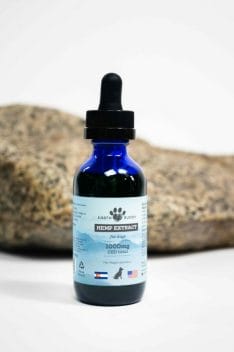What Does Hemp Extract Do for Pets?
December 12, 2022
Written By: Earth Buddy Team

As pet parents, we want the best for our dogs and cats. That’s why we feed them the best food, put them on regular exercise schedules, and give them plenty of attention. We want them to be happy, healthy, and live a long life. Unfortunately, as your pet gets older and has a longer list of medical conditions, it’s not always easy to keep up with their needs. Many pet parents elect for some type of pharmaceutical medication, but hemp oil may also be considered. Hemp oil comes from cannabis plants which have been developed to contain very little THC. However, they still contain other compounds, including cannabinoids and terpenes, that may help with stress relief or healthy inflammatory responses. Hemp oil may also improve other aspects of your pet’s health. In this article, we’ll discuss what hemp extract does for your pet as well as the health benefits of hemp extracts and hemp seed oil.
Hemp oil comes from cannabis plants which have been developed to contain very little THC. However, they still contain other compounds, including cannabinoids and terpenes, that may help with stress relief or healthy inflammatory responses.
Hemp oil may also improve other aspects of your pet’s health. In this article, we’ll discuss what hemp extract does for your pet as well as the health benefits of hemp extracts and hemp seed oil.
The Endocannabinoid System
To understand the health benefits of hemp extract for pets, you first need to understand how it works. All mammals, including us, our cats, and our dogs, have something called an Endogenous Cannabinoid System (ECS). Mammalian bodies have endocannabinoids that are found within the ECS. There are two primary endocannabinoids in the body, including:
- 2-AG: This endocannabinoid is found in high concentrations in the central nervous system.
- Anandamide: The receptor responsible for the therapeutic benefits associated with THC.
There are also two types of receptors found within the endocannabinoid system:
- CB1 receptors: Found throughout the brain and spinal cord; they’re also present in other parts of the body including the kidneys, liver, heart and glands. They help regulate memory, thinking processes, appetite and discomfort pathways.
- CB2 receptors: Located primarily on white blood cells and some nerve cells in peripheral nervous system tissues outside the central nervous system such as spleen and tonsils; they play a role in regulating immune response to infection by activating certain types of T cells.
The ECS is responsible for maintaining homeostasis, or balance, within the body. This includes regulating discomfort response, neurological functions, immune health, and gastrointestinal health. The Cannabis sativa plant contains compounds that interact with the endocannabinoid system by binding to receptors within the body.
The Compounds in Cannabidiol
Cannabidiol (CBD), one of the most prevalent cannabinoids found in the cannabis plant, may have therapeutic benefits for pets. In fact, CBD has been shown to be effective in managing many of the same conditions that it does in humans, including discomfort, stress and inflammatory pathways.
In addition to cannabidiol, other components found in cannabis can also be beneficial for pets’ health. These include terpenes, which are naturally occurring compounds found in plants that give each one its unique smell and taste characteristics; phytocannabinoids like tetrahydrocannabinol (THC) and cannabigerol (CBG); as well as flavonoids such as terpenes, which are naturally occurring compounds found in plants that give each one its unique smell and taste characteristics, and flavonoids like linalool and beta-caryophyllene.
What Does Hemp Extract Do for Stress?
CB1 receptors help regulate stress and mood. The CB1 receptor is thought to be responsible for most of the psychoactive effects of cannabis consumption, primarily with high THC levels. But it also has a role in regulating stress response, maintaining homeostasis (balance) within the body, and keeping stress at bay.
When cannabidiol is absorbed in the body, CB1 receptors respond to the compound allowing the brain to better regulate serotonin levels. Once serotonin levels are regulated, mood balancing and relaxing effects may be recognized. This is why you may notice your pet calms down following the administration of Full Spectrum Hemp Extract.
Improved Gut Health
Your pet’s gut health may be improved by incorporating Full-Spectrum Hemp Extract into your pet’s daily regimen. Hemp extract contains terpenes, which are aromatic compounds found in many plants. Terpenes have been shown to have antioxidants and promote healthy inflammatory responses in the body.
There are several types of terpenes in hemp extract, including pinene, limonene, linalool, nerolidol, and beta-caryophyllene. These terpenes may help normalize gut function by promoting a healthy inflammatory response and supporting digestive processes.
CBD Oil for the Gut Microbiome
Now, what does hemp extract do for gastrointestinal health? CBD, the primary constituent of Full Spectrum Hemp Extract, promotes a healthy gut microbiome. A significant amount of the immune system has been found to be within the gut. As such, a healthy gut is critical not only to our pets’ gastrointestinal health, but also to their immune health. Both go hand-in-hand with one another (along with the other ailments discussed within this article).
Since cannabidiol improves normal inflammatory processes, when paired with a healthy diet, it may alleviate gastrointestinal complications, like IBS. Studies show that there is an abundance of CB2 receptors found in the gut, which may help normal inflammatory responses associated with digestive upset when using hemp extracts for pets.
What Does Hemp Extract Do for Discomfort?
Full Spectrum Hemp Extract may provide natural relief for joint discomfort, as it can support healthy inflammatory responses, and promote overall well-being. Discomfort is also modulated by the endocannabinoid system. When cannabidiol interacts with the receptors in the nervous system, discomfort signals are weakened to aid in bringing the body back to balance.
Discomfort is also caused by normal inflammatory pathways within the body. THC and CBD both have shown to promote healthy inflammatory responses. Other cannabinoids, including CBG, CBC, and THCV also contribute to the management of normal inflammatory responses. All of these compounds are found in a Full Spectrum Hemp Extract.
Immune Function
Remember those receptors we were discusssing? Cannabidiol binds to the cannabinoid receptors of weakened immune cells, which regulates cell survival, the cell’s ability to replicate, and normal inflammatory pathways. Weakened immune systems generally spreads uncontrollably through the body because the apoptosis switch is turned off.
When the apoptosis switch is turned off, weakened immune systems fool the body into thinking cells are its own and allows the cells to replicate. When the apoptosis switch is turned on, cell suicide occurs, which results in cells that are no longer meant to be in the body being destroyed.
Complications of Endocannabinoid Deficiency
When we talk about endocannabinoid deficiency, it’s helpful to think of the body’s cannabinoid receptors as a lock and key system. The lock is made up of two main components: the CB1 receptor and the CB2 receptor. The keys are called endocannabinoids, which are naturally produced by our bodies.
When there isn’t enough endocannabinoid activity in the body, it can lead to many different health issues, including chronic discomfort, stress, mood balance, gastrointestinal problems, weakened immune systems, and sleep quality.
CBD oil from the cannabis plant may help restore balance to this system by increasing natural endocannabinoid activity in the body.
Utilizing Full-Spectrum Hemp Extract
You may now be wondering how to use CBD for pets. There isn’t necessarily an exact dosage to provide to every pet. Every dog is different and the amount they need depends on various factors including genetics, age, weight, and how their individual body interacts. Finding the right dose is a trial and error process until you find what works best. The ultimate goal is to offer the minimal effective dose. At Earth Buddy, we recommend a starting dose of 1-3mg per 10 lbs of body weight.
Essential Fatty Acids in Hemp Seed Oil
Hemp seed oil is extracted from hemp seeds in the hemp plant; predominantly the hemp seed kernel. Hemp seed kernels look like sunflower seeds, but they’re actually from the Cannabis sativa plant. Hemp seed oil is extracted from hemp seeds using cold pressing or expeller pressing. The process involves using a mechanical press to crush the hemp seeds between two metal plates until the oils are released. The end product is dietary hemp seed oil that can be added to your pet’s diet.
Essential fatty acids (EFAs) are a type of fat that the body cannot produce on its own, so it must be obtained from food. EFAs are found in many foods, such as fish, nuts and seeds. They are especially prevalent in hemp seed oil.
There are two types of EFAs: omega-3 and omega-6. Hemp seed oil contains both types of EFAs, along with other essential nutrients like vitamins A, C and E. These nutrients encourage the immune system to work properly and promote good health.
Omega-3 fatty acids have healthy inflammatory response properties and may help with many skin conditions in our dogs. Omega-6 fatty acids encourage proper immune response and support blood sugar balance. Both of these essential fatty acids can also promote brain health by improving mood, memory and learning ability.
Hemp seed oil has many uses, but one of its most popular is as a natural treatment for skin issues. However, consuming hemp seed oil may be beneficial to your dog in several ways including boosting the immune system, improving coat health, and contributing to their overall well-being. Consuming hemp seed oil can also aid in restoring a healthy balance between good bacteria and bad bacteria in your pet’s digestive tract.
For further reading, we recommend the sources listed below.:
- https://www.ncbi.nlm.nih.gov/pmc/articles/PMC7023045/
- https://pubmed.ncbi.nlm.nih.gov/24419242/
- https://www.mdpi.com/1424-8247/14/11/1169/htm?_ga=2.186461866.282617536.1670852003-1388799283.1651002441
- https://www.ncbi.nlm.nih.gov/pmc/articles/PMC8869992/
- https://www.ncbi.nlm.nih.gov/pmc/articles/PMC7693730/
- https://www.ncbi.nlm.nih.gov/pmc/articles/PMC5576607/
- https://pubmed.ncbi.nlm.nih.gov/2848184/
- https://pubmed.ncbi.nlm.nih.gov/31608295/
- https://www.ncbi.nlm.nih.gov/pmc/articles/PMC53598/pdf/pnas01030-0312.pdf?_ga=2.226887454.282617536.1670852003-1388799283.1651002441
You Might Also Enjoy
Learning how to calm a dog down is an essential skill to have in your…
Whole foods are integral to a dog’s diet, offering unprocessed, natural nutrients that promote and…
Hemp seeds, harvested from the hemp plant known as Cannabis sativa, have become known as…





